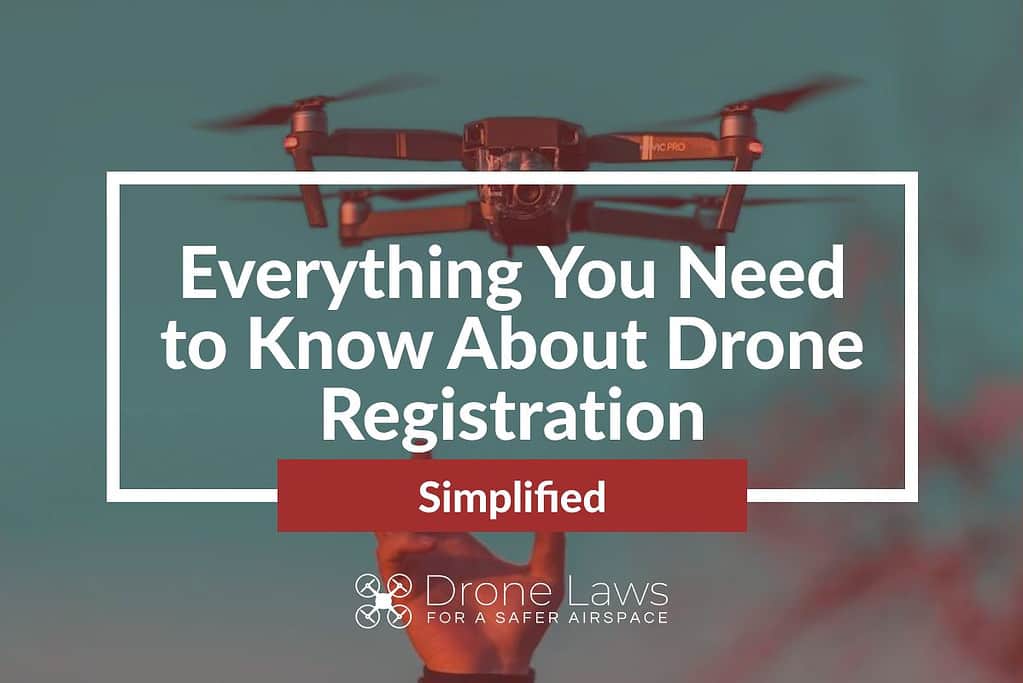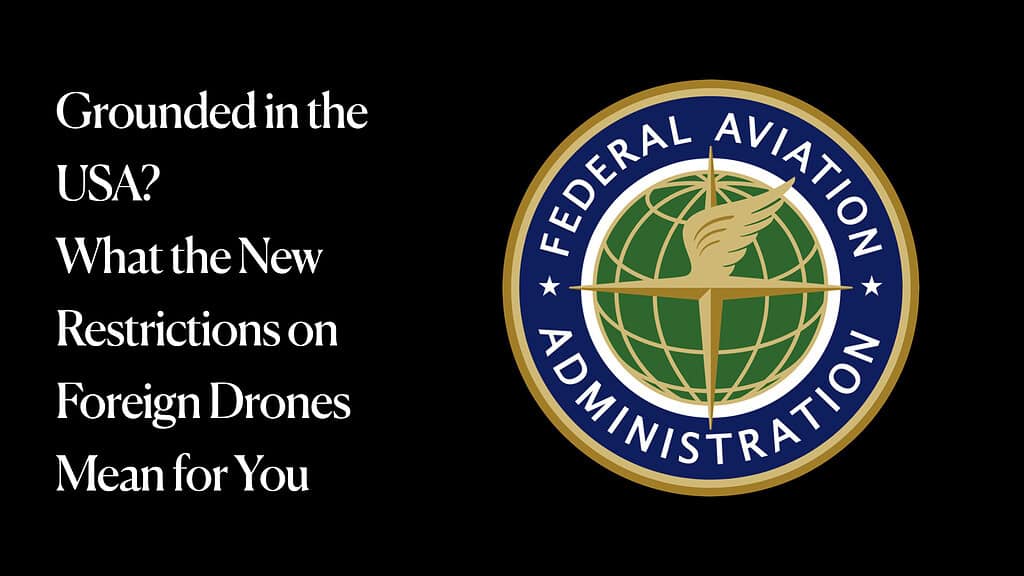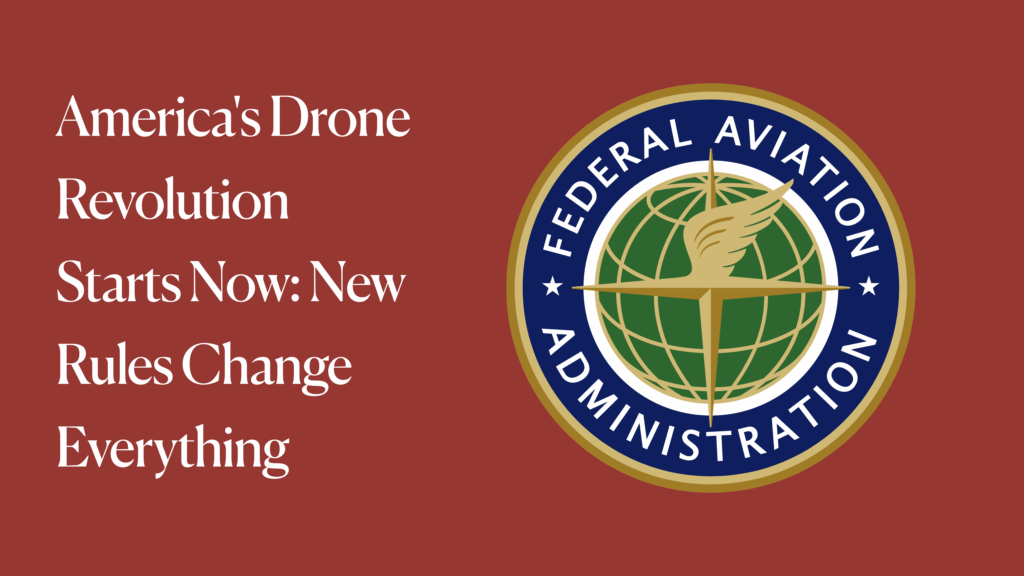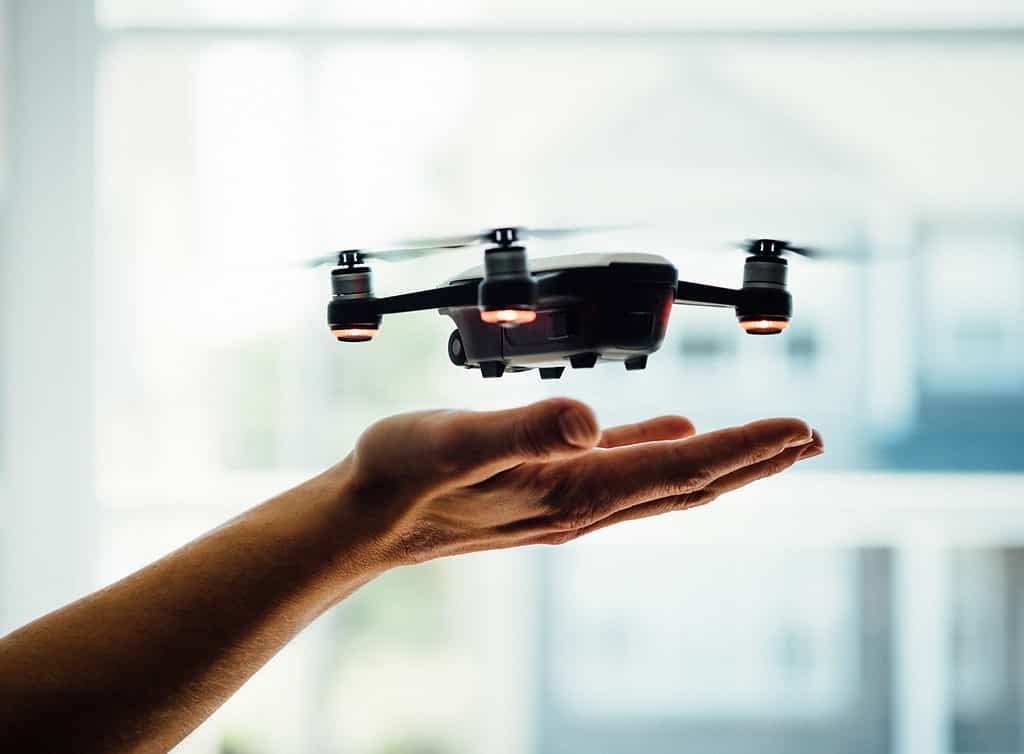You have a new drone, and before you fly you need to know if you need your drone registered. And if so, how to get that drone registration. Everything you need to know about drone registration is explained below.
Drone registration requirements vary by jurisdiction or, more accurately, drone regulator. Typically a drone is not required to be registered if it is considered a toy (generally weighing less than 0.55 pounds or 250 grams without a camera), and is required to be registered if it has a camera, weighs more than 0.55 pounds, or you are using it for commercial or other risky applications.
What should you know about drone registration in the United States and territories (including all FAA-regulated airspace)?
In the USA, the FAA regulates drone use under Part 107 (the FAA’s Small Unmanned Aircraft System Rule), with an exemption for recreational drone use (Section 44809 of Title 49 of the U.S. Code). Therefore, you do not need a drone registration if your drone use is recreational, falls within the scope of 44809, and is under 0.55 pounds. If your drone weighs 0.55 pounds or more and you are flying recreationally, you may register your drone using the Exception for Recreational Flyers. With that registration, you cannot fly your drone commercially. To fly your drone commercially or under the FAA’s Small UAS (SUAS) Rule (Part 107), you must use the Part 107 drone registration. A drone pilot may fly drones registered under part 107 commercially or recreationally.
Your drone registration is valid in all U.S. states and territories (where FAA regulates the airspace).
Do you need a drone registration? Recreational Use vs. Commercial Use Explained
Drone registration should not be confused with a drone license, drone pilot license, or remote pilot certificate. Those relate to the personnel operating the drone (which we discuss in detail in our Drone License explainer).
Drone registration requirements apply to every flying drone. So if you are flying multiple drones, each should be considered according to the following considerations.
Recreational drone use: If you only want to fly your drone for fun, you don’t need a registration if your drone is below 0.55 pounds and if you follow the rules in Section 44809 exception.
Recreational pilots must register the drone if it weighs 0.55 pounds or more and follows the Exception for Recreational Flyers rules (44809).
Those rules are:
- You fly the UAV only for recreational purposes.
- You fly the UAV following the standard operating and safety rules (a set of safety rules developed by a community-based group in collaboration with the Federal Aviation Administration for model aircraft and drones).
- You, as the pilot, fly your drone within your line of sight or the line of sight of a visual observer who is in the same place and talks directly with you. You or your uas operator must be able to see your drone (without visual aids such as a binocular).
- You do not interfere with and must give way to any manned aircraft during your drone flight.
- You fly in Class G airspace, fly the drone from the ground to no more than 400 feet above ground level, and follow all airspace limitations and prohibitions.
- As the pilot or drone operator, you receive authorization from the administrator or designee before operating in controlled airspace (Class B, Class C, Class D airspace, or Class E airspace). You must comply with all airspace limitations and prohibitions.
- As a drone pilot or operator, you passed the aeronautical knowledge and safety test (recreational UAS safety test – TRUST) and have proof of passing the test on file for the administrator or law enforcement to look at if they want to.
- You have registered your drone and marked it, and the administrator, a representative of the administrator, or law enforcement can see proof of registration if they want to.
If your drone requires registration (more than 0.55 pounds) and you fly it under the rules above (Section 44809 Exception), you have two choices for registering your drone:
- You can register your drone under section 44809 drone regulation (the Exception for Recreational Flyers rule). You can only use that drone recreationally. Or,
- You can register your drone under Part 107 rules which allow you to fly that drone recreationally or commercially.
Any recreational flight that does not qualify under the section 44809 rules above or any commercial drone flight must follow the FAA Part 107 rules, which require registering the drone under Part 107.
Commercial use drone: Commercial drone operators must have a Part 107 Drone Registration if they use the drone for business, work, or any commercial activity. With a Part 107 drone registration, commercial operators may fly their registered drone for a commercial purpose or recreationally.
We have provided more details on the recreational drone exception here: Section 44809 regulations.
We have also provided more details on the FAA Part 107 rule here: FAA 107
How to Get a Drone Registration
The process, information required, fees, etc., are the same for both (commercial operator or recreational use) types of drone registrations and are detailed below.
Eligibility
The Federal Aviation Administration (FAA) has specific drone registration requirements for anyone operating in the national airspace system.
- You are 13 years or older (if the owner of the drone is less than 13 years of age, then someone 13 years of age or older must register the drone)
- You must be a legal permanent resident or U.S. citizen.
- Please note the FAA will consider the certificate issued to foreign operators to be a recognition of ownership, not a certificate of U.S. aircraft registration.
Information Needed to Register
- Your Physical address and mailing address (if different from your physical address)
- Your Email address
- Your Phone number
- Your Make and model of your drone
- The Specific Remote ID serial number provided by the manufacturer (if applicable)
- Your Credit or debit card
Registration Fees
- Part 107 registration costs $5 per drone and is valid for three (3) years.
- The Exception for Recreational Flyers registration costs $5 and is valid for three (3) years.
- Once registered, you cannot transfer the drone registration between the type of regulation (part 107 or the Exception for Recreational Flyers).
Where to Register
- Register a drone online at FAA DroneZone (drone must weigh less than 55 pounds)
- Register a drone by mail.
You must register your drone by mail (N-number registration process) if:
- Your unmanned aircraft is 55 pounds or greater.
- You want to qualify a small unmanned aerial system for drone operation outside of the United States.
- You hold ownership title to an aircraft in trust.
- The small unmanned aircraft owner uses a voting trust to meet U.S. Citizenship requirements.
After You Register
Once you register your drone, you will receive an FAA registration certificate. You must have your registration certificate (either a paper copy or a digital copy) in your possession when you fly. If another individual operates your drone, they must have your drone registration certificate (either a paper or digital copy). Federal drone law requires drone operators who must meet any registration requirement to show their certificate of registration to any Federal, State, or local law enforcement officer if asked.
Failure to register a drone to meet any registration requirement may result in regulatory and criminal penalties. The FAA may assess civil penalties up to $27,500. Criminal penalties include fines of up to $250,000 and/or imprisonment for up to three (3) years.
Label Your Drone
The FAA requires you to mark all drones with your registration number before you fly them. Here is how to label your drone:
- Label your drone (PDF)
- You must maintain the label in a legible condition.
- Must be affixed to the small unmanned aircraft by any means necessary to ensure it remains affixed for each operation.
- Display the label legibly on the external surface of the small unmanned aircraft.
Renew Your Drone Registration
When your drone registration expires, you need to renew your registration at the FAA DroneZone. If you are having trouble logging into the DroneZone, you may need to reset your password (PDF). Be sure to use the email address you used when registering your drone with the FAA.
Remote Identification and Your Drone
Beginning September 16, 2023, all drone pilots required to register their drones must operate their aircraft following the remote I.D. rule for pilots, which gives drone owners sufficient time to upgrade their aircraft.
Drone manufacturers have until September 16, 2022, to produce drones with built-in standard remote I.D. View Remote ID for Industry. The FAA also encourages the early production of remote I.D. broadcast modules.
There are three ways drone pilots can meet the identification requirements of the remote I.D. rule:
- Operate a Standard Remote ID Drone (PDF) that broadcasts identification and location information of the drone and control station. A Standard Remote ID Drone has built-in remote I.D. broadcast capabilities.
- Operate a drone with a remote I.D. broadcast module (PDF), giving the drone’s identification, location, and take-off information. A broadcast module is a device that can be attached to a drone or a feature (such as a software upgrade) integrated with the drone. Persons operating a drone with a remote I.D. broadcast module must be able to see their drone at all times during the flight.
- Operate (without remote I.D. equipment) (PDF) at specific FAA-recognized identification areas (FRIAs) maintained by community-based organizations or educational institutions. FRIAs are the only locations unmanned aircraft (drones and radio-controlled model airplanes) may operate without broadcasting remote I.D. message elements.
How much does the drone registration cost?
Registering your drone with the FAA costs $5 and is valid for three years. The cost and validity are the same for Part 107 registration or the Exception for Recreational Flyers registration. Additional costs you might incur to begin commercial drone operations include getting your drone pilot license with the FAA, which costs $175 and is valid for two years, and drone insurance.
Where can I register my drone?
- Register a drone online at FAA DroneZone (drone must weigh less than 55 pounds)
- Register a drone by mail
Where can I find definitive drone information?
The FAA regularly publishes Advisory Circulars online. Each Advisory Circular guides compliance with airworthiness regulations, pilot certification, operational and training standards, and other rules within the 14 CFR Aeronautics and Space Title.
We make every effort on these pages to provide simple summaries of these definitive circulars.
Still, we always recommend checking the FAA website for more recent and authoritative regulatory information.
USA Drone Registration Summary
Congratulations! You have reached the end of this article on drone licenses. You should now understand when drone registration is required and how to get it.
Remember, if you are flying drones for any non-recreational purpose, or commercial reason, you must get a Part 107 registration. Drone operations under Part 107 must follow federal regulations. However, some jurisdictions might place additional limitations on drone flights. Find the specific state using the search function at the bottom of this page. There you will find any local drone regulations which drone operators must follow in addition to the federal regulations.
To get your drone registration, you must be at least 13 years old and be a U.S. Citizen or legal permanent resident.
Getting your drone registration may seem daunting, but it is worthwhile. With the appropriate drone registration, you can legally operate a drone recreationally or commercially, such as in aerial photography, surveying, and inspections.
What should you know about drone registration in your country?
Drone registration differs by country worldwide.
The preceding discussion deals with USA drone registration. Please note that the above process applies to every state and territory of the USA where the Federal Aviation Administration regulates airspace.
Use the search function at the bottom of this page to find the drone laws in your desired location (corresponding to the state, city, or country). In addition, you will find out if you need a drone licence, along with our outline of the specific drone licensing and registration requirements on each country page. We also provide links to the civil aviation authority, drone regulator, and online registration resources.
NOTE: This page is about the Regulation of Unmanned Aerial Vehicles: Small Unmanned Aerial Systems (SUAS), Small UAS, Remote Piloted Aerial Systems (RPAS), unmanned aerial vehicle (UAV), Unmanned Aerial System (UAS), and drone are interchangeable terms unless specified. Model Aircraft, toy, remote-controlled, and RC aircraft may be covered by the same regulations unless specified.
Find out why
We think you must use a Drone Preflight Checklist
And a Drone Post-flight checklist
Free Drone Flight Checklist PDF
This Drone Flight Checklist is better than others.
It’s free!
It includes both the preflight checklist and post-flight checklist
It’s an easy-to-use printable PDF that covers all your bases.
Traveling with a Drone?
Click here to read our Comprehensive Guide For Traveling With A Drone.
LET US CONNECT YOU
Calling All Drone Service Companies, Trainers, Tour Guides with Drone Experience
Contact Us with your website, email address and phone number using our Contact Page
We want to share your information with visitors who look for credible providers that follow the rules.
NOW IT’S YOUR TURN




Leave a Comment